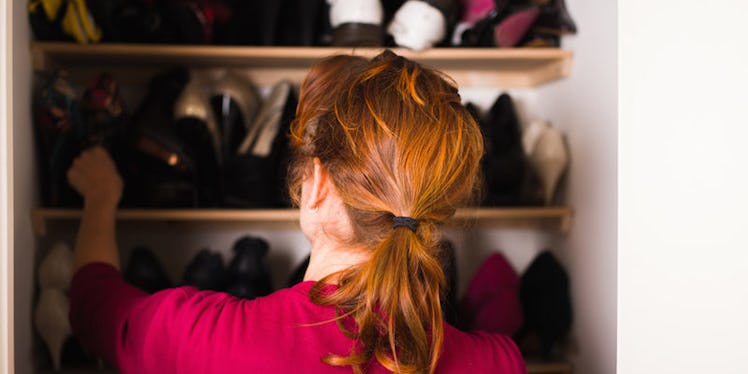
5 Things I Learned About The So-Called 'Life-Changing' Power Of Tidying Up
I am not a clean person.
I’m not a gremlin, though. I wash my sheets every so often, clean out my closet seasonally and invest in a bi-weekly housekeeper who keeps things dust and fur free (a must when you live with three Pomeranians and a fuzzy cat).
Recently, it seems like every blogger decided to lose their collective sh*ts over a book about tidying up. They swore it would change my life, change my apartment and make me happier. Quite a lofty claim about a book not written by J.K. Rowling.
“The Life-Changing Magic of Tidying Up” is supposed to single-handedly alter the way you see cleaning. It’s written by Marie Kondo, a Japanese organizing consultant who devoted her life to transforming your home into the living and breathing version of your “Dream House” Pinterest board.
After following her commandments for a full week, I decided there was no way in hell I would ever be cut out for this.
Here's what I learned:
1. You must always aim for perfection.
You know how your mom insisted there's no such thing as perfect, but only striving for it?
Not with Kondo’s method.
She insists on aiming for nothing less than perfection in your home. Honestly, I don’t think I’ll ever achieve anywhere near that when it comes to my cleaning habits. The reasoning behind her theory? If you achieve perfection once, you won’t spend your entire life cleaning.
Basically, if you’re the kind of person who cleans a little bit day-by-day, you’re going to spend your entire miserable life with Taylor Swiffer as a BFF.
2. You don’t need more storage.
This goes against virtually everything HGTV has taught me. I need built-in cupboards! I need wicker baskets! I need super complicated storage units because they make it look like I have less sh*t!
Kondo disagrees. The reason you think you need a trip to the Container Store is because you simply have too much stuff. Her method? Get rid of all the excess. Get rid of everything. F*ck it, get rid of her book too, when it no longer serves its purpose.
3. You need to purge.
You need to go through every item you own — lipsticks, glasses, shoes, dish towels — and decipher if you truly need them. Or, in Kondo speak, if they bring you "joy."
As I went through my makeup collection — which, for the record, takes up an entire IKEA drawer set — I had a bit of a panic attack. My lipsticks don’t bring me joy exactly, but I do love them. What constitutes a joyful feeling for inanimate objects? How do I know if my eyebrow pencil makes me happy? What defines happiness?
Here’s a hint: If you have to question the meaning of life while cleaning out your closet, you need to step away and get outside more.
4. You have to thank things.
I thank my friends when they pay me a compliment. I thank my doorman when he opens the door. I thank my dog walker when she comes back with my pooch and she's still alive.
I don’t thank my toothbrush for keeping my teeth clean. I don’t thank my prom dress for giving me joy when I bought it. I don’t thank the half-full bottle of vodka in my fridge because it made me happy (and drunk).
You know who thanks inanimate objects? Lunatics. Oh, and me, when I’m not sober.
I tried thanking my dog yesterday for not pooping on the bed and giving me joy as a result, she looked at me like I was stupid. I can’t even blame her.
5. You don’t know how to fold your clothes.
My method of folding things? Throwing them in my closet and dealing with it four times a year when I rotate my wardrobe out of storage.
Kondo follows the KonMari method, which is a way of folding your clothes so when they’re in your drawers, they take up minimal space but are still visible enough for you to know they’re still there. You’re supposed to do this for all your clothes — sweaters, tees, pants, underwear.
I’ll be honest: I tried this for about two days, but then I got drunk over the weekend and just kind of threw my clothes on the floor before bed.
Surprisingly enough, the world didn’t implode when I woke up. Weird.